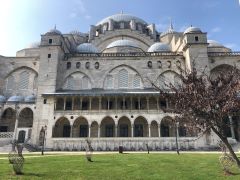Corpus Musicae Ottomanicae and RISM
Jennifer Ward
Thursday, June 13, 2024

RISM was invited to a workshop entitled “Mapping and Harmonizing Metadata and Normed Data” on March 14 and 15, 2024, hosted by the Orient-Institut Istanbul and led by participants of the project Corpus Musicae Ottomanicae (CMO). The CMO project produces critical editions of Near Eastern music manuscripts alongside a source catalog, both of which are freely available online. The source catalog focuses on Ottoman music from the 19th century onwards.
The music in the CMO repertoire was written using Hampartsum notation as well as staff notation, plus six other kinds of notation systems. Other differences set the Ottoman music apart from much of the music found in the RISM database, notably usûl and makâm for rhythmic and tonal organization, respectively.
Despite these points of difference, the workshop was built around the commonalities of CMO, RISM, and information organizations such as the German National Library’s Integrated Authority File and Musiconn: strong metadata, robust authorities, and standardized vocabularies.
In my talk, I gave some statistics about the RISM project as it stands in 2024, with over 1.5 million records for historical musical sources available on two platforms, the RISM Catalog and RISM Online. I shared information about our RISM working groups that have cataloged music from non-Western music traditions, including our contributors in South Korea, the Chinese-language region, and Greece. The RISM database includes a handful of people who lived in the Ottoman Empire or Turkey, such as Sultan Abdülmecid I (with music dedicated to him by Gioachino Rossini: RISM Catalog | RISM Online) and the composer Turgut Aldemir (RISM Catalog | RISM Online).
RISM has been in contact with Corpus Musicae Ottomanicae (CMO) since 2016 when we first heard about the project. Given our shared interests in source cataloging, we have been in regular contact since then, in order to discuss ways of collaborating and sharing written musical traditions with a wider audience. The workshop from this past spring has opened up further opportunities for us to work together. I would like to thank Dr. Nihan Tahtaişleyen and her colleagues for organizing the workshop and hosting us in Istanbul.
Image: Süleymaniye Mosque, Istanbul. The mosque complex includes the Süleymaniye Manuscript Library (TR-Is). Photo courtesy of the author.
Share Tweet EmailCatégorie: Nouveau au RISM

